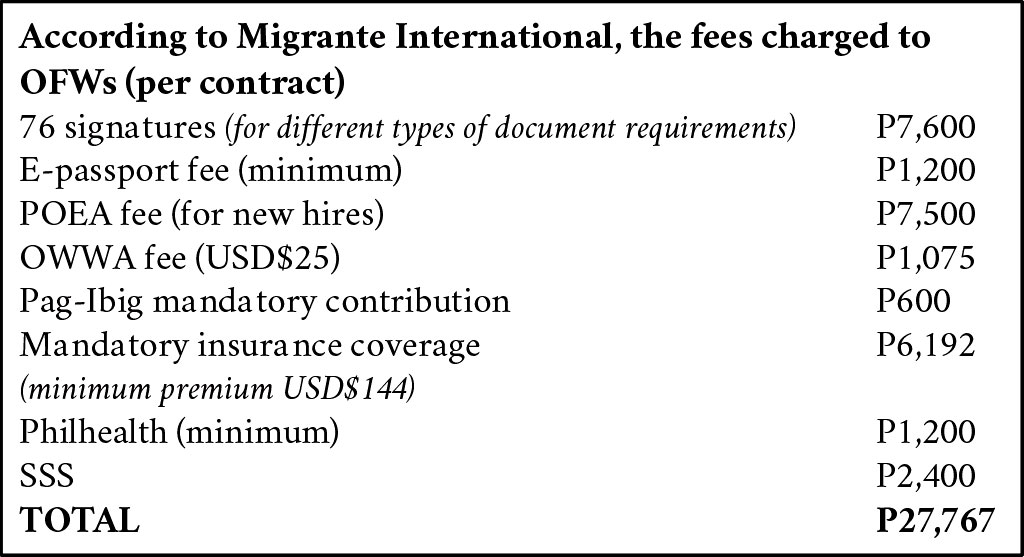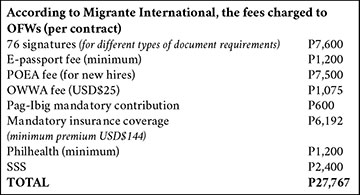“Madadagdagan na naman ang mga babayaran namin. Mababa na nga ang sahod ang dami pang mga babayaran. (Another added cost that we need to pay for. We’re already making low wages and there are so many other costs that need to be taken care of.)” said Linda, a temporary foreign worker in Edmonton. “Buwan buwan na bayarin yun ano na lang ang matitira sa amin. Hindi kami gatasang baka. (That’s every month, with whatever little left over for us. We’re not milking cows.)” she added.
Linda was reacting to the bicameral approval of the bill imposing the mandatory SSS for all OFWs. From the Php 4.64 Billion worth of voluntary contributions garnered by SSS from OFWs in 2016, the amount is set to increase by 3000 % next year 2019. That would translate to Php 144 Billion in the first year of implementation alone.
“The Duterte government will be amassing hundreds of billions from SSS collections at the expense of OFWs who are already burdened by numerous state exactions. Forcing all OFWs to be covered as compulsory SSS members is outrageous since this exaction will be on top of the US$144 mandatory insurance recently enacted under the Duterte regime through POEA,” Migrante International spokesperson Arman Hernando said.
Under the proposed Social Security Act of 2018, the mandatory SSS membership will include both sea-based and land-based migrant workers as the monthly contribution rate is set to go up to 12% or Php 2,400 per month in 2019. From then on, it is expected to gradually increase reaching 15% by 2025.
The bill will necessitate the government’s negotiations of labor agreements with host countries like Canada to compel foreign employers to pay the required monthly contribution for migrant workers. However in the instance that host countries refuse to get foreign employers to comply with this SSS scheme, the workers themselves will be forced to fully pay for the entire monthly contribution rate.
Once the bill gets signed, it will be the largest monetary accumulation imposed by the government on its foreign workers in the history of the Philippines’ labor export program.
Prior to this, there was another state exaction by the Duterte government through POEA Governing Board Resolution No.04. It ordered the inclusion of returning OFWs in its compulsory insurance policy. This resolution exhibits the government handing over its responsibility of providing protective services for OFWs to the private sector. This mandatory insurance was only from new hires, but now the government is now looking into increasing state income from rehires to further boost the profit of private insurance providers.
By charging each rehire with the insurance cost of US$144, POEA-accredited insurance providers are set to rake at least Php 7.6 billion every year hinging on last year’s deployment figure of almost a million rehires. This whopping amount does not include collections from new hires. In most cases, these additional exactions either end up as salary deductions or as excessive charges by recruitment agencies and many migrant repatriates do not even receive their insurance claims. Instead, their ticket fares are deducted from their salaries.
These two increases were the latest of the many increases over the years. Migrante International estimates that the previous Aquino government collected an average of at least P26,267 from every overseas Filipino worker (OFW) processed by the Philippine Overseas Employment Administration (POEA). This amount is higher than the average P18,000 that the government collected before 2010. The new administration imposed new additional fees.

If POEA claims that there are 6,000 OFWs that leave daily to work abroad, it means that the government earns an average P166.6 million a day, or roughly P59 billion yearly, from processing fees and other costs shouldered by OFWs. These fees do not yet include other fees and tax schemes imposed on OFWs, such as the affidavit of support (AOS), in some countries and the compulsory insurance policy.
Migrant workers face many hardships and issues. And the Philippine Embassies and Consulates are last to assist. One worry is where this money goes if it does not serve migrants. Aside from the official government fees many migrants pay for other expenses like loans, fees of host countries and fees of their consultants and recruiters.
As far as Linda is concerned, she needs to work two jobs during the week and one on weekends. A big portion of her salary goes to paying for the fees, her loans and her immigration consultant. The rest of her salary goes to her daughter back home. She hardly spends for herself. Like many migrant workers, her dream is to be with her daughter. For now she has to work overtime to make that dream come true. “At sana irespeto naman kaming mga OFW ng mga gobyerno bilang tao at hindi lang gatasang baka (And I also wish that we get some respect from governments and for them to not just treat us as milking cows.)” Linda said before she headed off to start her shift.


